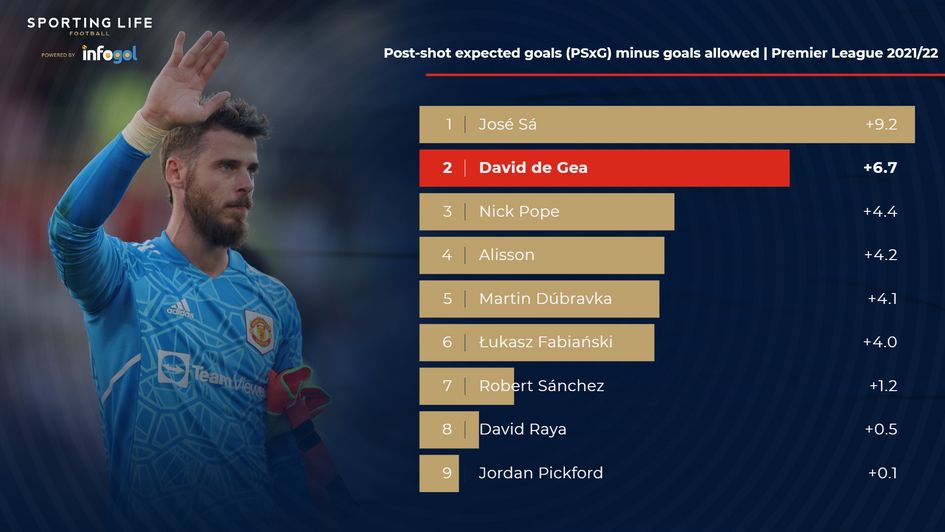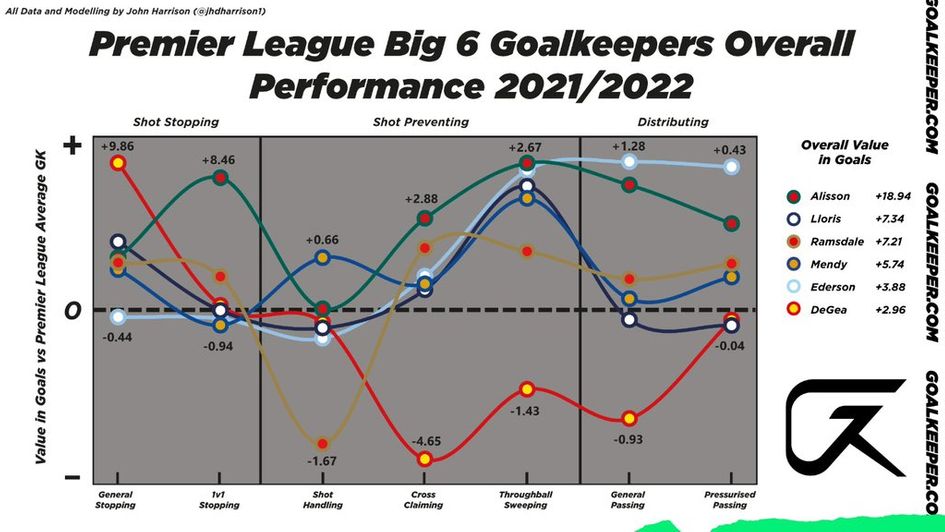Manchester United must improve in a number of areas, including passing, creating chances and defending.
David Moyes’ critiques — posted by United’s official Twitter account in December 2013 — still ring true almost nine years later, perhaps becoming more memeable by the day.
A sign of the times at a calamitous club.
United’s goalkeeping was not an area of concern back then. David de Gea had overcome a shaky start to his Premier League career, establishing himself as one of the first names on the teamsheet in the post-Sir Alex Ferguson era.
Fast-forward to August 2022 and a comparable De Gea is short of the level required to be first choice goalkeeper at a club with high aspirations, such are the advancements in the role.
In the debate about which position has evolved most in modern football, a prisoner of the moment/recency bias mentality means a raft of roles are mentioned.
Full-backs might well be the consensus vote right now given the changes in the game, but it could be argued that goalkeeping has undergone the biggest shift in a short amount of time.
All aspects of the job are tested in almost every fixture, specifically at the highest level of the sport.
Manchester United's embarrassing 4-0 defeat at Brentford was further evidence of that being the case, with each goal exposing a different facet of the position, providing confirmation that De Gea's value has depreciated drastically.
Shot-stopping still supreme
Of course, shot-stopping still reigns supreme in terms of value added by a goalkeeper, but the margins between attributes are completely divergent to even a few years ago.
It is widely recognised that De Gea is an excellent shot-stopper.
The Spaniard's 2017/18 campaign, when United finished second under José Mourinho, is one of the greatest goalkeeping demonstrations in Premier League history in that area, preventing 8.5 goals with saves per FBRef's post-shot expected goals (PSxG) minus goals allowed metric.
He excelled in the same sphere last season, too. Only José Sá prevented more goals with shot-stopping than De Gea's 6.7 PSxG according to FBRef.

- Post-shot expected goals (PSxG) is measured by information from the point the shot has been taken up until the shot were to pass the goalkeeper; a metric that is expected goals (xG) based on how likely a goalkeeper is to save a shot.
Goalkeeper.com data scientist and modeller John Harrison had De Gea preventing 10.16 goals through shot-stopping, despite holding an average 1v1 rating.
Unfortunately for United, De Gea requires such overperformance in shot-stopping to negate his shortcomings.
Granted, mistakes are going to be made over the course of a season, but in allowing Josh Dasilva's shot to squirm past him, there is little point in persisting with De Gea. After all, he suffers in other facets of the much-changed position, which simply invites more shots from the opposition.
Somewhat ironically, that gives him the opportunity to improve his shot-stopping numbers.
"𝗡𝗜𝗚𝗛𝗧𝗠𝗔𝗥𝗘 𝗙𝗢𝗥 𝗗𝗘 𝗚𝗘𝗔!" 🙈
— Sky Sports Premier League (@SkySportsPL) August 13, 2022
The #MUFC goalkeeper with a horror spill as Josh Dasilva's shot creeps through 😬 pic.twitter.com/Gqzo9XqF2c
Distribution is a problem
Brentford's second goal allows us the opportunity to discuss a real weakness in De Gea's game — distribution.
Returning to John Harrison's data from last season, De Gea posted a -0.96 expected goals (xG) figure when solely accounting for distribution. The frailty reared its head on multiple occasions on Saturday.
In addition to provoking pressure on a struggling defence, it adversely affects United's ability to build from the back, seriously restricting the impact of Erik ten Hag's appointment.
Ederson, Alisson, Édouard Mendy and Aaron Ramsdale have all enhanced their team's attacking abilities through distribution.
You would only have to look as far as De Gea's opposite number on Saturday to realise how vital an attribute it has become in the Premier League...
I'll just leave it here https://t.co/xvvBXswK9S pic.twitter.com/sW0lT5V7c9
— DB (@DatoBHJ) August 13, 2022
Importance of shot-prevention
If shot-stopping is still supreme in goalkeeping, shot-prevention is a comfortable second.
United's third goal conceded is a good example of De Gea’s inability to command his area, often stuck to his line as opposed to helping alleviate pressure on defenders.
Per FBRef, the 31-year-old stopped just 3.3% of crosses into the United penalty area in 2021/22. No other goalkeeper stopped fewer.
Indeed, John Harrison's (@Jhdharrison1) model suggests De Gea is a long way off his 'Big Six' contemporaries in terms of goals prevented from cross claiming (-4.65 xG) last season.
De Gea held a lowly sweeping rank in the same model, too, posting a -1.43 xG prevented figure. He recorded just nine defensive actions outside of the penalty area according to FBRef, the lowest of any first-choice keeper in the Premier League.
Add in a fourth goal where De Gea made a poor decision to move into no man's land and Saturday’s display was a perfect microcosm of the limitations you have to accept when starting with him as your goalkeeper.
Henderson rubs salt into the wound
To rub salt into a relatively fresh wound, Dean Henderson produced a sparkling performance in the very next Premier League game, keeping a clean sheet after being peppered by West Ham on Sunday.
Loaning out Henderson to Nottingham Forest is yet more confirmation that Manchester United is a club that cannot be taken seriously in its current guise.

There are many factors contributing to the demise of United, a goalkeeping conundrum just one of them, but De Gea's situation encapsulates the direction of the club nicely.
From the very top, there's a distinct failure to recognise that football has changed and that they need to change with it.
Thankfully, the more things change, the more one particularly vital ingredient stays the same. Football is a meritocracy, and Ten Hag's side sit bottom of the league.
You learn or you lose. United are losing — spectacularly.










